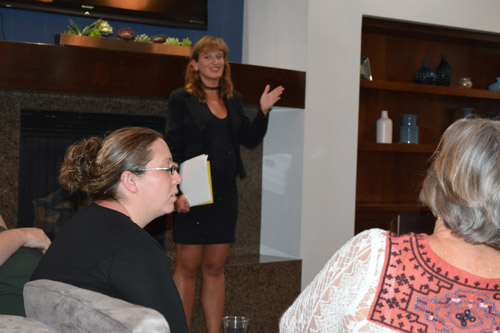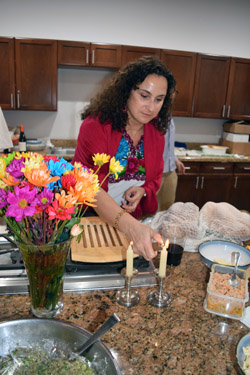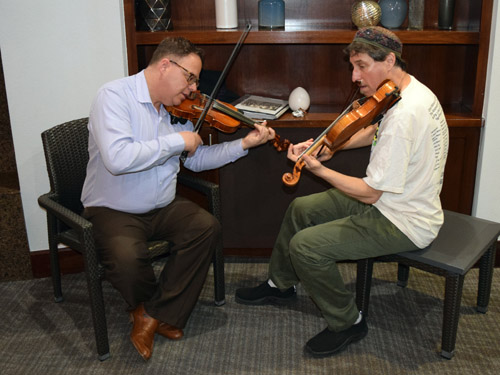
By Donald H. Harrison


SAN DIEGO – Erev Shabbat prayers, a vegetarian dinner, a ribbon cutting, and a klezmer jam session helped to inaugurate the Yiddish Arts and Academic Association of North America (YAAANA) on Friday night at a clubhouse in the Costa Verde Village. About 30 people ranging from young adults to seniors attended the function, organized by Jana Mazurkiewicz, a doctoral candidate in Yiddish theatre.
Mazurkiewicz is a native of Poland who recently converted to Judaism, the religion of her father. She said a rabbi in Los Angeles who converted her speaks Yiddish, and actually conducted the conversion ceremonies in Yiddish.
The YAAANA organizer said that her dissertation subject at the University of Michigan is the Yiddish Theatre of post-war Poland, adding that she has an interest in preserving what otherwise might vanish: whether it be Yiddish or theatre.
“I know as a Yiddishist that most of the organizations in San Diego that are dealing with Jewish culture are about Israel or Hebrew,” she commented. The kinds of groups that communicate in Yiddish tend to gather in separate, very distinct circles, she added. “One circle is the Orthodox one, and the other is the academic one. Both of these circles are quite hermetic and they don’t spread Yiddishkeit.”
Unfortunately, Mazurkiewicz said, there are numerous misconceptions about Yiddish in the American Jewish community. Some people perceive it as a backward, folkloric kind of language, she said. However “Yiddish doesn’t have to be old-fashioned or kitschy, or heavy or funny necessarily.”
Asked the kinds of reactions she had received as she researched Yiddish theatre, she responded that she could give many examples, but one example in Tel Aviv came immediately to mind: “I went to a party where people claimed not to speak Yiddish, that they had nothing to do with Yiddish whatsoever, until the fifth glass of vodka and then suddenly everyone spoke Yiddish! I think it is deep inside the Jewish nation – not everyone of course, not the Sephardim (many of whom spoke Ladino, or Arabic) – but it is interesting to discover these layers of Jewishness.”

How does Mazurkiewicz plan to keep YAAANA going, inquired Yale Strom, the klezmer musician, documentary film maker and ethnomusicologist, who later jammed at the function with his wife, vocalist Elizabeth Schwartz, and visiting musician Oliver Thompson, principal violinist of the Moody Jews of Boise (Idaho).
Mazurkiewicz replied that she has applied for grants and if she does not get them she will seek donations. She said her hope is to become the executive director of the group and perhaps to be able to hire a staff in order to put on events either weekly or biweekly.
Mazurkiewicz evidently is quite expert at networking, having met many of the YAAANA event’s attendees at social gatherings, then encouraging them to come to learn about Yiddishkeit. While programs may involve subtitled films or Yiddish music, English will be the primary language for discussion, she said.

Among those attending were the Avraham family—Chaim, his wife Wendy, daughter Dafna, son Gabriel, and Gabriel’s girlfriend, Lauren Coden. Wendy had met Mazurkiewicz at a Rosh Chodesh event at Congregation Beth El, and decided she wanted to attend YAAANA. “I would love to learn Yiddish,” she told me. “Whatever is part of the Jewish people I want to keep alive.”
Chaim, an Israeli native, is the son of Romanian parents, and spoke Yiddish even before he spoke Hebrew. He told me he is glad YAAANA got started because, “I don’t want Yiddish to die. Language is a culture; it is a manifestation of a culture, a history, and we don’t want Yiddish to vanish.”
His wife interjected: “It is part of his childhood: fond memories, family, food – all the good things.”
Gabriel said his family usually has Shabbat dinner together every Friday night, so when his mother proposed they all attend the YAAANA event, he agreed. Normally, he said, a night devoted to Yiddish would not be on his radar. More up his alley, he said, was a country music concert which he and Lauren planned to attend later in the night: a concert featuring Frankie Ballard. But, having attended, he said, Yiddishkeit is a subject of interest to him.
Sara Maltzman was another attendee. She had met Mazurkiewicz at a meeting of the Yiddish Circle, a first Monday of the month group that convenes at the Lawrence Family JCC. “I want go get immersed in Yiddish and Yiddishkeit,” Maltzman said. “It’s the culture of Eastern European Jewry and it is a vital, beautiful, wonderful culture and it’s part of my history and who I am.”
Previous generations of her family lived near Minsk, the capital of Belarus, she said, adding that her interest in Yiddishkeit has been percolating for some time.
“It’s going back to my roots, appreciating my family, my culture, where I came from,” Maltzman said. “For many years now, I’ve had an interest in learning Yiddish and finding out about our history before it is lost – and making sure it doesn’t get lost.”
While the Yiddish Circle meets monthly, a Monday night group meets more often in private homes, including that of one of the organizers Lucy Goldman, who also attended the YAAANA event.
Also there was Melanie Rubin, senior adult director at the Lawrence Family JCC, who said the Yiddish Circle is geared toward people who already speak or understand Yiddish. “Unfortunately, it has gotten smaller and smaller over the years,” she said. “Yiddish is a vanishing language and as the seniors get older and older, some are no longer able to come. Today, perhaps a dozen people come, sometimes more, sometimes less.”
On occasion, the club has had some activities that are Jewish or Israel oriented, “not just Yiddish,” Rubin continued. “In the past they have asked me for a piano because they wanted to do some singing. One year they did a Yiddish version of My Fair Lady. We put it on.”
YAAANA’s next event will be a screening of Mazurkiewicz’s multilingual play, Wooden Wars, or Anyone Can Be Jewish These Days, to be screened from 3 p.m. to 5 p.m., Saturday, April 15, in the Costa Verde Village Theatre, 8720 Costa Verde Blvd. RSVPs may be sent to yaaana.org@gmail.com or phoned to (619) 719-1776.
Another upcoming event of interest will be conducted at 7 p.m., Wednesday, April 12, at the Smith Recital Hall at San Diego State University. Titled “Desert Caravan: New Jazz from Israel and Beyond,” it will bring Israeli jazz guitarist and oudist Amos Hoffman and Toronto-based pianist and composer Noam Lemish to the campus, to play with Yale Strom and his band Hot Pstromi “in a concert featuring exciting jazz arrangements of Israeli songs originating from Yemenite, North African, Russian and Persian Jewish communities.”
According to a flyer circulated at the YAAANA meeting, “Lemish and Hoffman are members of an imaginative quartet that fuses Middle Eastern rhythms with the sounds of Jazz and Classical music.” Hot Pstromi members in addition to Strom and Schwartz are Duncan Moore, percussion; Jeff Pekarek on bass; and Trip Sprague on tenor sax.
*
Harrison is editor of San Diego Jewish World. He may be contacted via donald.harrison@sdjewishworld.com